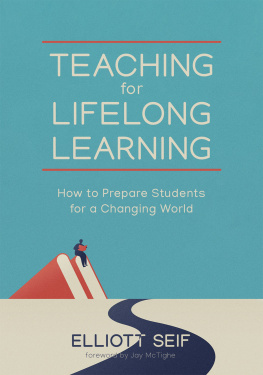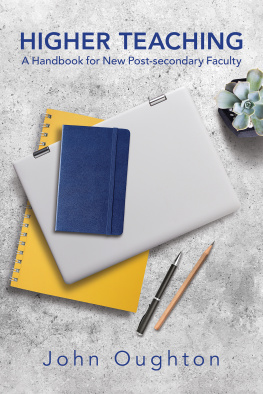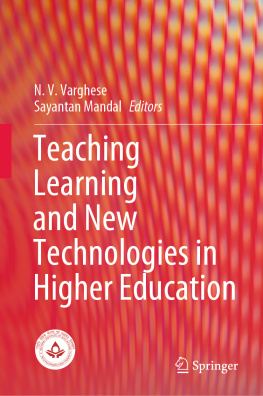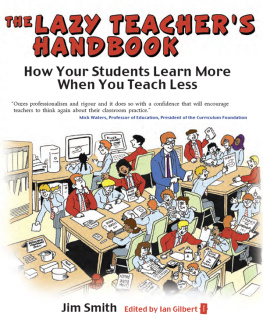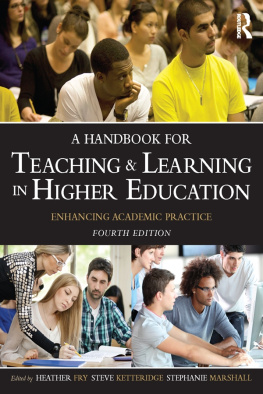Cover
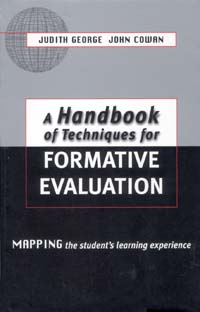
| title | : | A Handbook of Techniques for Formative Evaluation : Mapping the Student's Learning Experience |
| author | : | George, Judith W.; Cowan, John |
| publisher | : | Taylor & Francis Routledge |
| isbn10 | asin | : | 074943063X |
| print isbn13 | : | 9780749430634 |
| ebook isbn13 | : | 9780585384900 |
| language | : | English |
| subject | College students--Rating of--Handbooks, manuals, etc, College teaching--Evaluation--Handbooks, manuals, etc, Education, Higher--Aims and objectives. |
| publication date | : | 1999 |
| lcc | : | LB2333.G46 1999eb |
| ddc | : | 378.12 |
| subject | : | College students--Rating of--Handbooks, manuals, etc, College teaching--Evaluation--Handbooks, manuals, etc, Education, Higher--Aims and objectives. |
Page i
A Handbook of Techniques for
FORMATIVE EVALUATION
Page ii
This page intentionally left blank.
Page iii
A Handbook of Techniques for
FORMATIVE EVALUATION
MAPPING the student's learning experience
JUDITH GEORGE
JOHN COWAN

Page iv
First published 1999
Apart from any fair dealing for the purposes of research or private study, or criticism or review, as permitted under the Copyright, Designs and Patents Act 1988, this publication may only be reproduced, stored or transmitted, in any form or by any means, with the prior permission in writing of the publishers, or in the case of reprographic reproduction in accordance with the terms and licences issued by the CLA. Enquiries concerning reproduction outside these terms should be sent to the publishers at the undermentioned addresses:
Kogan Page Limited | Stylus Publishing Inc. |
120 Pentonville Road | 22883 Quicksilver Drive |
London | Sterling |
N1 9JN | VA 20166-2012 |
UK | USA |
Judith W George and John Cowan, 1999
The right of Judith W George and John Cowan to be identified as the authors of this work has been asserted by them in accordance with the Copyright, Designs and Patents Act 1988.
Although this book remains subject to copyright, permission is granted free of charge to photocopy for personal use the checklist material in the Appendix. |
British Library Cataloguing in Publication Data
A CIP record for this book is available from the British Library.
ISBN 0 7494 3063 X
Typeset by Kogan Page Limited
Printed and bound by Clays Ltd, St Ives plc
Page v
CONTENTS
INTRODUCTION | |
1. APPROACHING CURRICULUM DEVELOPMENT SYSTEMATICALLY | |
Where does formative evaluation fit in? | |
Why is it an iterative process? | |
What approaches to evaluation are there? | |
What kind of information do you need from formative evaluation? | |
What, then, should your formative evaluation cover? | |
How will you deal with the outcomes, and plan action? | |
Don't neglect the students! | |
The relationship between formative and summative evaluations | |
Educational enquiries a case study describing modes of enquiry | |
2. CHOOSING A METHOD OF FORMATIVE EVALUATION AND USING IT | |
What do you want to know? | |
The purpose should determine the method | |
The potential to bring about change is an important consideration | |
Multiple perspectives can enhance evaluation, and its usefulness | |
Beware your own assumptions | |
Consider resourcing carefully especially in terms of human resource | |
Is the evaluation likely to convince those who receive it? | |
The process | |
Our grouping of methods | |
Page vi
3. OBTAINING INFORMATION ABOUT THE IMMEDIATE LEARNING EXPERIENCE | |
Our descriptions | |
Possible gender differences | |
Method 3.1 Self-confidence surveys | |
Method 3.2 Dynamic lists of questions studying learning during an event | |
Method 3.3 Observations a method which depends on the assistance of a colleague | |
Method 3.4 Critical incident technique | |
Method 3.5 Talk-aloud protocols | |
Method 3.6 Journals, diaries and logs which we regard as different | |
Method 3.7 Self-review | |
Method 3.8 Collecting comments from groups | |
4. OBTAINING INFORMATION ABOUT IMMEDIATE REACTIONS DURING THE LEARNING EXPERIENCE | |
Method 4.1 Identifying students' constructs in relation to their learning | |
Method 4.2 Interpersonal process recall | |
Method 4.3 Journals again! | |
5. OBTAINING INFORMATION ABOUT LEARNING OUTCOMES | |
Method 5.1 Concept mapping | |
Method 5.2 Pre-testing and post-testing | |
Method 5.3 Analysis of exam answers | |
Method 5.4 RSQC2 | |
6. OBTAINING INFORMATION ABOUT STUDENT REACTIONS AFTER THE EXPERIENCE | |
Method 6.1 Questionnaires | |
Method 6.2 Interviews | |
Method 6.3 Delphi techniques | |
Method 6.4 A letter to next year's students | |
Method 6.5 A closing 'wash-up' session perhaps with a preparatory session | |
Method 6.6 'Not quite' rounds | |
Method 6.7 Collecting Post-its | |
Page vii
Method 6.8 Focus groups | |
Method 6.9 Stop/start/continue | |
7. IDENTIFYING TOPICS THAT MERIT FURTHER EVALUATIVE ENQUIRY | |
Method 7.1 Nominal group technique | |
Method 7.2 Q-methodology | |
Next page


